牛津深圳版七年级下册Unit3-4知识梳理学案(无答案)
文档属性
| 名称 | 牛津深圳版七年级下册Unit3-4知识梳理学案(无答案) |
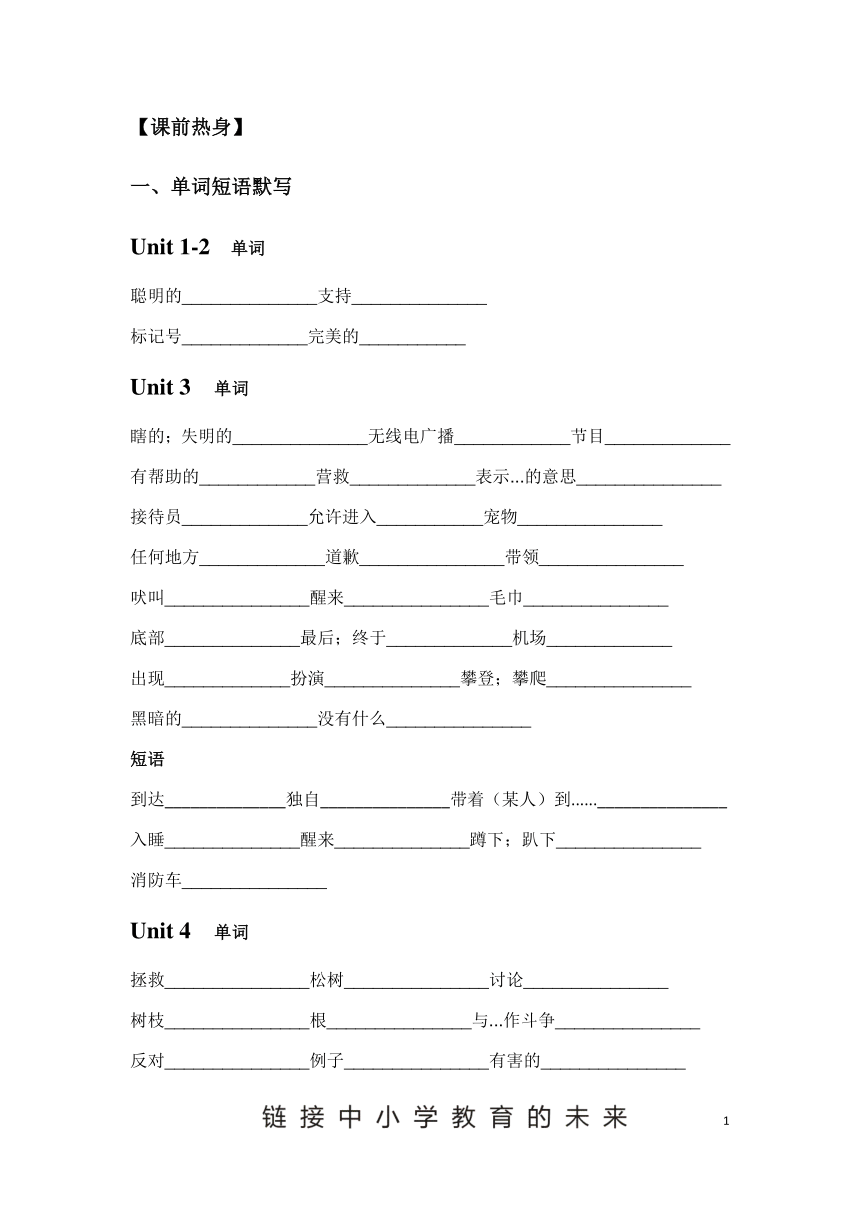
|
|
| 格式 | zip | ||
| 文件大小 | 46.5KB | ||
| 资源类型 | 教案 | ||
| 版本资源 | 牛津译林版 | ||
| 科目 | 英语 | ||
| 更新时间 | 2020-07-07 00:00:00 | ||
图片预览

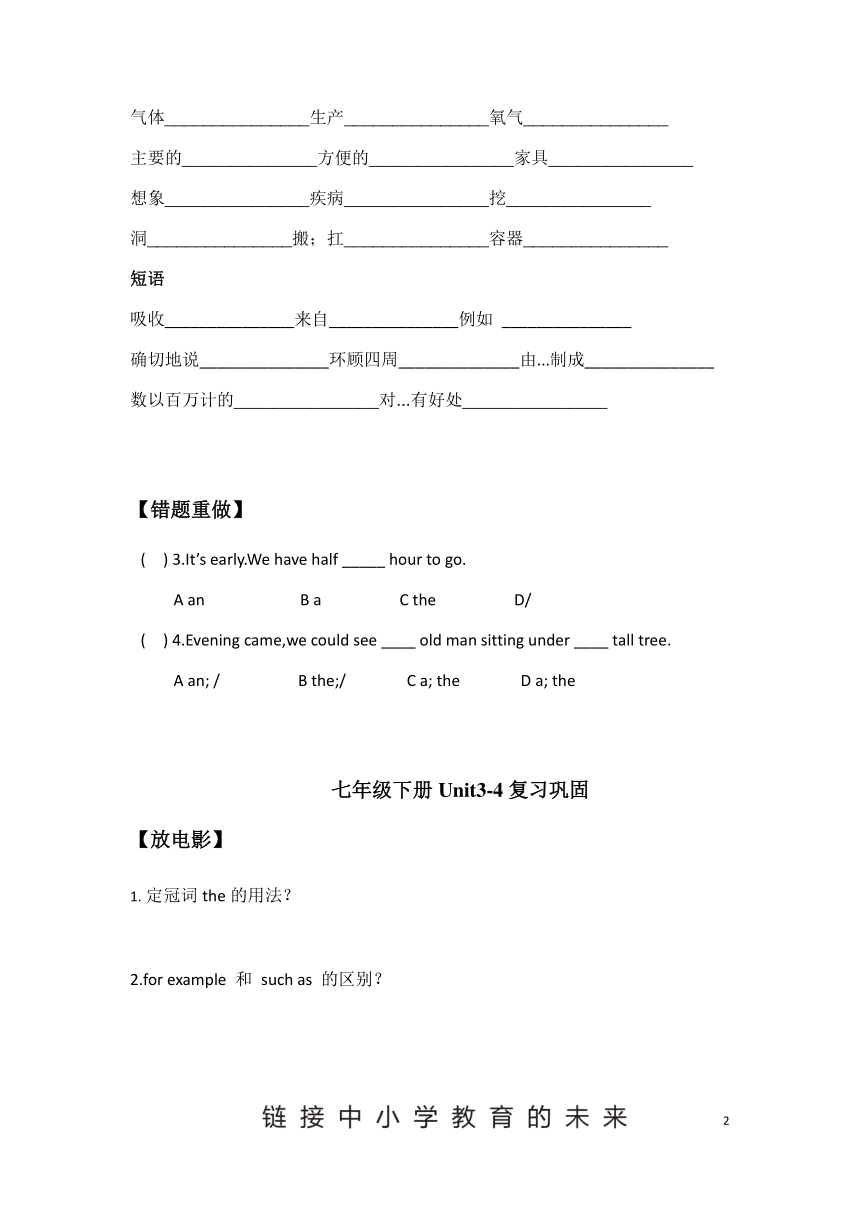
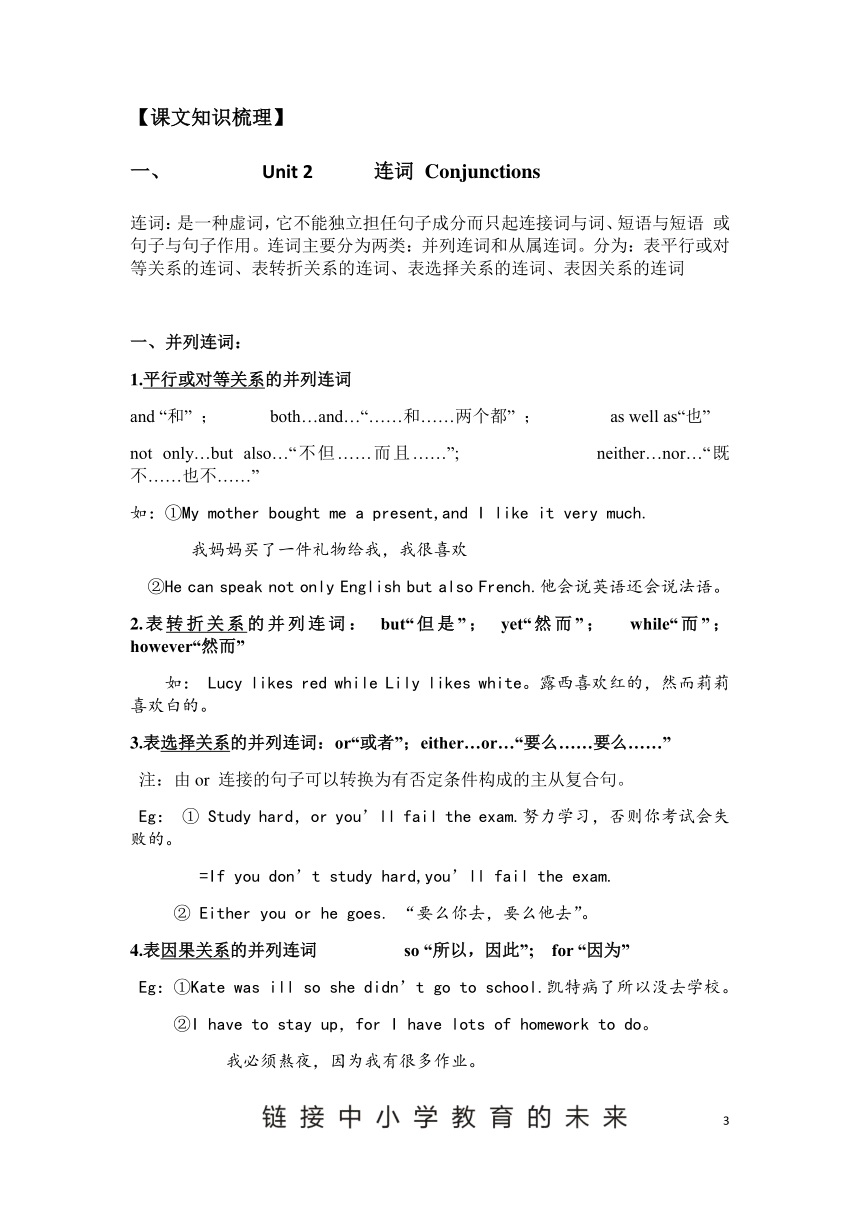
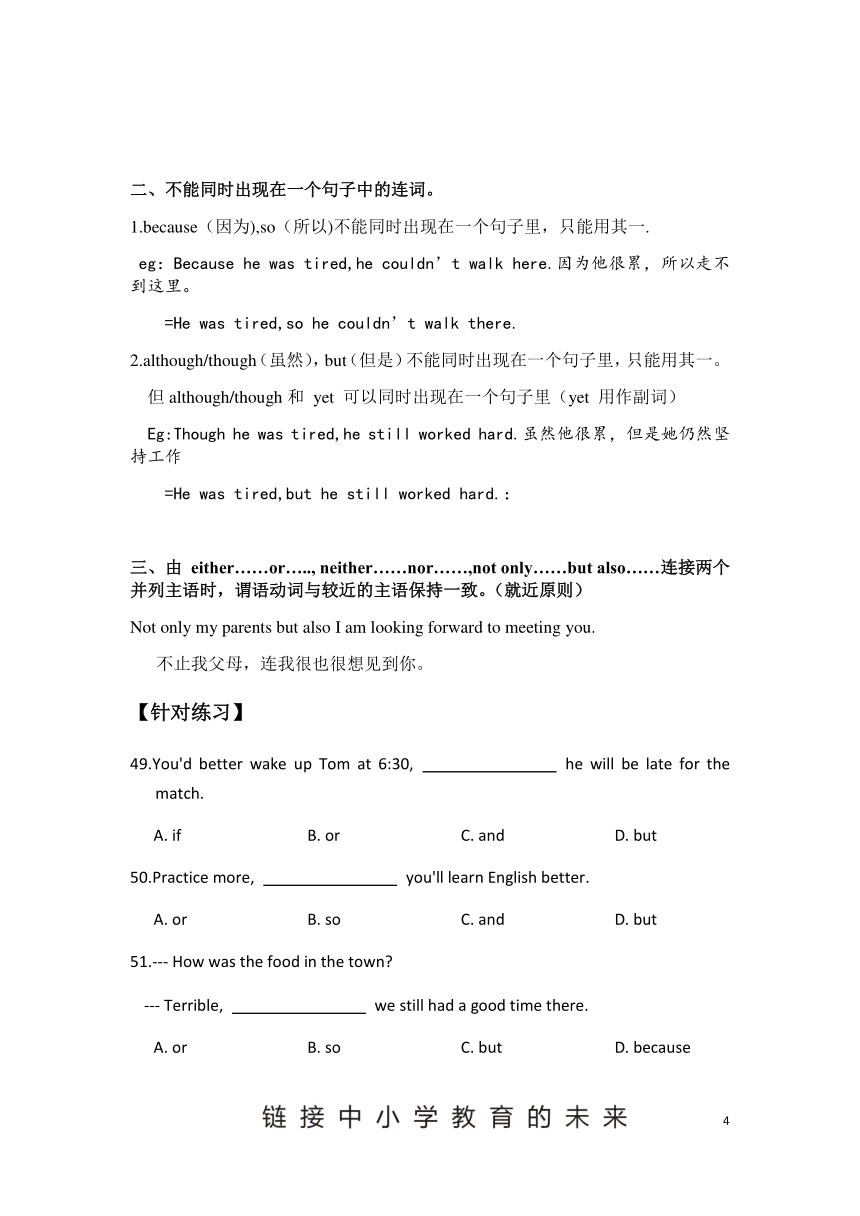
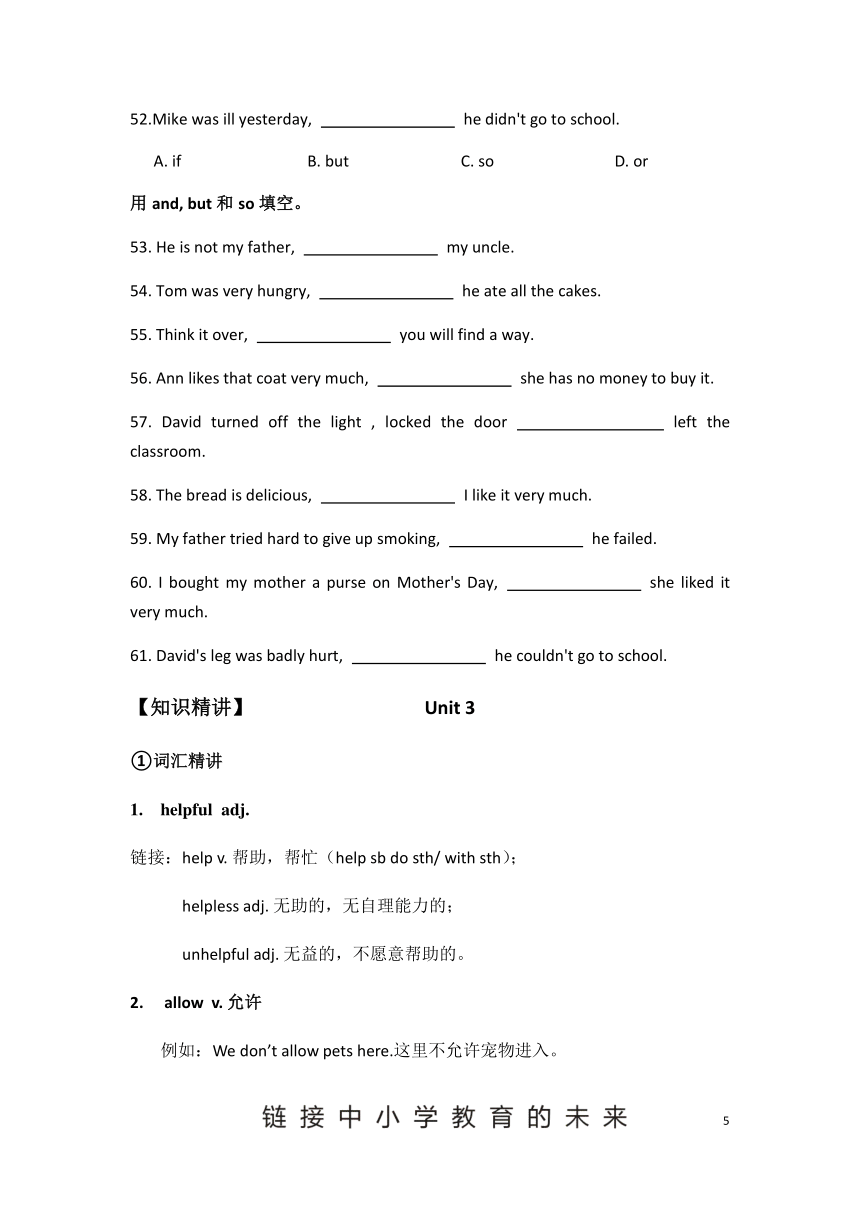
文档简介
【课前热身】
一、单词短语默写
Unit
1-2
单词
聪明的______________支持______________
标记号_____________完美的___________
Unit
3
单词
瞎的;失明的______________无线电广播____________节目_____________
有帮助的____________营救_____________表示...的意思_______________
接待员_____________允许进入___________宠物_______________
任何地方_____________道歉_______________带领_______________
吠叫_______________醒来_______________毛巾_______________
底部______________最后;终于_____________机场_____________
出现_____________扮演______________攀登;攀爬_______________
黑暗的______________没有什么_______________
短语
到达______________独自_______________带着(某人)到......_______________
入睡______________醒来______________蹲下;趴下_______________
消防车_______________
Unit
4
单词
拯救_______________松树_______________讨论_______________
树枝_______________根_______________与...作斗争_______________
反对_______________例子_______________有害的_______________
气体_______________生产_______________氧气_______________
主要的______________方便的_______________家具_______________
想象_______________疾病_______________挖_______________
洞_______________搬;扛_______________容器_______________
短语
吸收_______________来自_______________例如
_______________
确切地说_______________环顾四周______________由...制成_______________
数以百万计的_______________对...有好处_______________
【错题重做】
(
)
3.It’s
early.We
have
half
_____
hour
to
go.
A
an
B
a
C
the
D/
(
)
4.Evening
came,we
could
see
____
old
man
sitting
under
____
tall
tree.
A
an;
/
B
the;/
C
a;
the
D
a;
the
七年级下册Unit3-4复习巩固
【放电影】
定冠词the的用法?
2.for
example
和
such
as
的区别?
【课文知识梳理】
Unit
2
连词
Conjunctions
连词:是一种虚词,它不能独立担任句子成分而只起连接词与词、短语与短语
或句子与句子作用。连词主要分为两类:并列连词和从属连词。分为:表平行或对等关系的连词、表转折关系的连词、表选择关系的连词、表因关系的连词
一、并列连词:
1.平行或对等关系的并列连词
and
“和”
;
both…and…“……和……两个都”
;
as
well
as“也”
not
only…but
also…“不但……而且……”;
neither…nor…“既不……也不……”
如:①My
mother
bought
me
a
present,and
I
like
it
very
much.
我妈妈买了一件礼物给我,我很喜欢
②He
can
speak
not
only
English
but
also
French.他会说英语还会说法语。
2.表转折关系的并列连词:
but“但是”;
yet“然而”;
while“而”;
however“然而”
如:
Lucy
likes
red
while
Lily
likes
white。露西喜欢红的,然而莉莉喜欢白的。
3.表选择关系的并列连词:or“或者”;either…or…“要么……要么……”
注:由or
连接的句子可以转换为有否定条件构成的主从复合句。
Eg:
①
Study
hard,or
you’ll
fail
the
exam.努力学习,否则你考试会失败的。
=If
you
don’t
study
hard,you’ll
fail
the
exam.
②
Either
you
or
he
goes.
“要么你去,要么他去”。
表因果关系的并列连词
so
“所以,因此”;
for
“因为”
Eg:①Kate
was
ill
so
she
didn’t
go
to
school.凯特病了所以没去学校。
②I
have
to
stay
up,for
I
have
lots
of
homework
to
do。
我必须熬夜,因为我有很多作业。
二、不能同时出现在一个句子中的连词。
1.because(因为),so(所以)不能同时出现在一个句子里,只能用其一.
eg:Because
he
was
tired,he
couldn’t
walk
here.因为他很累,所以走不到这里。
=He
was
tired,so
he
couldn’t
walk
there.
2.although/though(虽然),but(但是)不能同时出现在一个句子里,只能用其一。
但although/though和
yet
可以同时出现在一个句子里(yet
用作副词)
Eg:Though
he
was
tired,he
still
worked
hard.虽然他很累,但是她仍然坚持工作
=He
was
tired,but
he
still
worked
hard.:
三、由
either……or…..,
neither……nor……,not
only……but
also……连接两个并列主语时,谓语动词与较近的主语保持一致。(就近原则)
Not
only
my
parents
but
also
I
am
looking
forward
to
meeting
you.
不止我父母,连我很也很想见到你。
【针对练习】
49.
You'd
better
wake
up
Tom
at
6:30,
?
he
will
be
late
for
the
match.
A.
if
B.
or
C.
and
D.
but
50.
Practice
more,
?
you'll
learn
English
better.
A.
or
B.
so
C.
and
D.
but
51.
---
How
was
the
food
in
the
town?
---
Terrible,
?
we
still
had
a
good
time
there.
A.
or
B.
so
C.
but
D.
because
52.
Mike
was
ill
yesterday,
?
he
didn't
go
to
school.
A.
if
B.
but
C.
so
D.
or
用and,
but和so填空。
53.
He
is
not
my
father,
?
my
uncle.
54.
Tom
was
very
hungry,
?
he
ate
all
the
cakes.
55.
Think
it
over,
?
you
will
find
a
way.
56.
Ann
likes
that
coat
very
much,
?
she
has
no
money
to
buy
it.
57.
David
turned
off
the
light
,
locked
the
door
?
left
the
classroom.
58.
The
bread
is
delicious,
?
I
like
it
very
much.
59.
My
father
tried
hard
to
give
up
smoking,
?
he
failed.
60.
I
bought
my
mother
a
purse
on
Mother's
Day,
?
she
liked
it
very
much.
61.
David's
leg
was
badly
hurt,
?
he
couldn't
go
to
school.
【知识精讲】
Unit
3
①词汇精讲?
helpful??adj.??
链接:help?v.?帮助,帮忙(help?sb?do?sth/?with?sth);
helpless?adj.?无助的,无自理能力的;??
unhelpful?adj.?无益的,不愿意帮助的。?
?allow??v.?允许??
例如:We?don’t?allow?pets?here.这里不允许宠物进入。
(提示:allow?sb?to?do?sth允许某人做某事)??
anywhere??adv.?任何地方??
例如:Are?you?going?to?anywhere?this?summer?
I?can’t?find?my?book?anywhere??
链接:由any组成的不定代词(包括any)常用于否定句和疑问句;相反,由some组成的不定?代词(包括some)常用于肯定句中。?
例如:I?found?my?pen?somewhere.??
apologize??v.?道歉(提示:?apologize?to?sb向某人道歉;?
apologize?for?sth/?doing?sth?为某事/做某事道歉)?
例如:I?apologized?to?John?for?losing?his?book.??
链接:apology?n.?道歉;谢罪??
例如:We?trust?for?Japanese?government’s?apology.?
Please?accept?my?apology.
lead??v.(过去式led)?带领;通向;指引??
例如:He?led?us?out?into?the?garden.?
链接:leader?n.?领导;领袖?Mao?Zedong?is?a?great?leader.?
bark??v./n.?犬吠;吠声??
例如:The?dog?always?barks?at?strangers.??
wake?v.?(过去式woke)醒来,唤醒??
例如:I?always?wake?late?in?the?winter.?
链接:wake?up?醒来?
例如:Wake?up?Lily,?its?time?to?get?up.???
bottom?n.?底部;末端;臀部;尽头?
at
the
bottom
of
...
在...底部
例如:Which?one?is?it,?top?or?bottom??
链接:from?head?to?foot.从头到脚。?
例如:He?looked?at?the?girl?from?head?to?foot.?
finally??adv.?终于,最后,决定性地???
例如:Finally,?we?won?the?match.?
链接:final?adj.?最终的,决定性的,不可更改的。
final?exam??期末考试??
France?and?Spain?will?meet?in?the?soccer?cup?final.??
随堂练习
blind?
radio?
bottom?
helpful??
programme
On
the
Open
Day
of
our
school,
our
parents
watched
the_____
by
the
students
at
the
school
hall.
Exercise
is
__________
to
keep
us
healthy.
We
shouldn’t
make
jokes
about
the
_______.
Instead,
we
should
help
them.
Nowadays,
not
many
young
people
enjoying
listening
to
the
______.
The
river
is
so
clear
that
you
can
see
the_______
of
it.
重难句精讲
One?day,?John?Dancer?and?Charlie?arrived?at?a?hotel.?
链接:常见的表示“到达”的词有arrive,?reach,?和get,?他们的区别如下:?
arrive?at?+?小地点;
arrive?in+大地点(如国家,城市,地区等);
arrive?+地点副词???
如:Do?you?know?what?time?the?plane?arrives?in?London??
They?arrived?at?the?station?at?eight?o’clock?this?morning.?
She?arrived?home?late?yesterday.
(2)
reach+地点?如:They?reached?Beijing?on?17?February.?
(3)
get?to+地点;
get?+?地点副词??
如:I?get?to?school?at?7:30?every?day,?and?get?home?at?5:00?in?the?afternoon.?
Mr.?Green?arrived?in/got?to/reached?Wuhan?last?night.?
You’re?welcome?to?stay,?but?I’m?sorry?that?we?don’t?allow?pets?here.
I’m?sorry?that...后可跟陈述句来表达“本人对...感到抱歉”?之意。?
如:I?am?sorry?that?I?broke?your?model?car?just?now.??
I’m?blind?and?I?can’t?go?anywhere?by?myself.
?by?oneself?意为“独自;单独”,相当于alone的意思。?
如:The?old?man?lives?all?by?himself?in?that?big?house.
The?receptionist?apologized?and?led?John?and?Charlie?to?their?room.?
lead?(sb.)?to?意为“带着某人到....”。?
如:She?led?the?horse?back?to?the?stable(马厩).。
lead?to还可以表示“通向....”;“导致”的意思。?
如:The?road?leads?to?the?sea.
His?carelessness?led?to?this?serious?traffic?accident.?
He?soon?fell?asleep.?
(1)
sleep强调“睡觉”这一动作,可与表示时间的状语连用。?如:He?slept?for?eight?hours.?他睡了八个小时。?
(2)
be?asleep?表示“睡着”的状态,其中asleep不能用very修饰,只能用sound,?fast等修饰。?
如:The?baby?is?fast/sound?asleep.婴儿睡得很香。?
(3)
fall?asleep“睡着”,表示一个动作的过程,侧重于“自然而然地入睡”的含义。?
如:He?was?just?falling?asleep?when?there?was?a?loud?knock?at?the?door.
(4)
go?to?sleep?指“入睡,进入梦乡”这个动作,即begin?to?sleep.?
如:He?was?so?tiered
that?he?went?to?sleep?soon.?
(5)
go?to?bed?“就寝,上床睡觉”,着重上床准备睡觉的动作,无“睡着”之意。???????
如:He?usually?goes?to?bed?at?ten?o’clock?and?goes?to?sleep/fall?asleep?five?minutes?later.??
Some?time?later,?Charlie?started?barking.?
一段时间+later表示“...(时间)之后”。?
如:Eight?years?later,?the?little?boy?became?an?excellent?university?student.?
sometime“(将来或者过去某个时候)”?
This?house?was?built?sometime?in?1980.??
We’ll?take?our?holiday?sometime?in?August
sometimes“有时候”,频度副词。
如:I?sometimes?have?letters?from?him.?
some?time“一段时间”
如:We?plan?to?stay?in?Hainan?for?some?time.
some?times?“几次,几倍”。
如:We?have?met?some?times?before.
With?Charlie’s?help,?John?put?some?wet?towels?along?the?bottom?of?the?door.?
with?one’s?help?“在某人的帮助下”,?
如:With?their?help,?we?opened?a?small?bookshop.?
with?the?help?of?...“在...的帮助下”,?
如:He?walked?with?the?help?of?a?walking?stick.
A?fireman?arrived?and?got?him?out?of?the?building.?
get....out?of...?“将...从...取/弄出来”。?
如:He?went?to?the?fridge?and?got?a?carton?of?milk?out?of?it.
随堂练习
by?oneself?
arrive?at?
fire?engine?
fall?asleep?
wake?up?
get?down?
lead...to?
get...out?of...
1.?The?manager______me_____my?new?office.?
2.?I?_____?at?about?4?o’clock?this?morning.?
3.?Would?you?please?help?me_____?the?toys?______?the?heavy?box??I?can’t?carry?it?
4.?You?cannot?leave?your?son?at?home_______.?He?is?too?young.?
5.?Please?dial?119?and?call?a?_______.?The?building?next?to?ours?is?on?fire.?
6.?Andy?was?so?tired?that?he________?in?bed?almost?immediately.?
7.?You?should________?on?the?floor?to?wait?for?help?when?there?is?a?fire.?
8.?Jason?and?Mandy?_____school?at?7:00?this?morning.?
【语法精讲】
介词
常用介词
in、on、behind、next
to、near、over、under
(1).
in在……里面:
The
pencil
is
in
the
desk.
铅笔在课桌里。
(2).
on在……上面:
There
are
some
apple
on
the
tree.
树上有些苹果。
(3).
under在……下面/正下方:What's
under
your
desk?
你书桌底下是什么?
(4).
over在……正上方:
There
is
a
shelf
over
the
table.
桌子上方有一个书架。
(5).
above
在……斜上方:Raise
your
arms
above
your
head.
(6).
below
在……斜下方:Her
skirt
came
below
her
knees.
(7).behind在……之后:
There
is
a
bike
behind
the
tree.
树后有一辆自行车。
(8).next
to在……旁边:There
is
a
café
next
to
the
barber's.
理发店隔壁是一家咖啡馆。
(9).near在……附近:My
bed
is
near
the
window.
我的床在窗户旁。
(10).by
在……旁:He
was
sitting
by
the
window
.
第一组:over,
above和on的用法
1)over指在…的正上方,表示垂直在上。如:
There
is
a
lamp
over
the
desk.
2)above指在上方,属于斜上方。如:
Raise
your
arms
above
your
head.
3)on指在上面,表示两物体接触。如:There
is
a
cup
on
the
table.
第二组:under
/
below的用法:
1)
under在……下面/正下方:What's
under
your
desk?
2)
below
在……斜下方:Her
skirt
came
below
her
knees.
练习:
(
)
1
The
boat
is
passing___
the
bridge.
through??
B.
below??
C.
under??
D.
across
(
)
2
Two
planes
are
flying___
the
city.
through??
B.
over
,??
C.
on
,??
D,
below
(
)
3
We
can
see
a
river
running
to
the
east____
the
hill.
under??
B.
below??
C.
over??
D.
on
(
)
4
Do
you
see
the
kite
___
the
building.
A.
over??
B.
cross??
C.
on??
D.
Above
第三组:in
和on表示“在……上”
1,门一类——镶嵌在墙里的,用in,
字画一类——挂在墙面上的,用on
(
)
1
He
put
up
a
map
___
the
back
wall
because
there
was
a
hole
___
it.
on;
on
B.
at;
in
C.
on;
in
D.
on;
at
(
)
2
There
is
a
door___
the
wall.
A.
on
B.
to
C.
of
D.in
(
)
3
Any
man
___
eyes______
his
head
can
see
that
he's
exactly
like
a
rope.
A.
with;
on
B.
with;
in
C.
on;
with
D.
in;
with
2,鸟一类落在树上的,用in;苹果一类长在树上的,用on
(
)
1
There
are
some
birds
singing___
the
trees.
in
B.
on
C.
at
D.
from
(
)
2
There
are
so
many
apples___
that
tree.
A.
in
B,
on
C.
at
D.
from
第四组:in
/on/
to表示“接壤”
B
在A里—用in
A和B相邻(接壤)—用on
A和B不相邻(不接壤)—用to
用介词填空。
1.
Shanghai
is
located
_______
the
east
of
China.
2.
Handan
is
_______
the
south
of
Hebei
province.
3.
Hainan
is
_______
the
south
of
China.
4.
Japan
is
_______
the
east
of
China.
5.
Henan
province
is
_______
the
south
of
Hebei
province.
(
)
1
The
United
States
is
____
the
south
of
Canada
and
___
the
east
of
Japan.
A.
to;
in??
B.
on;
to??
C.
in;
beside??
D.
at;
on
(
)
2
The
man
stood____the
window,
watching
the
boys
playing
outside.?
A.
in??
B.
by??
C.
with??
D.
to
(
)
3
Japan
lies____
the
east
of
China.
A.
on??
B/
to??
C.
in??
D.
with
第五组:at,
in表示“在……”
at表示较小的地点。如:
at
the
bus
stop,
at
home
2)in表示较大的地点。如:
in
China,
in
the
world
(
)
1.
Uncle
Wang
arrived____
No.
14
Middle
School
half
an
hour
ago.
A.at
B.
in
C
to
D.
/
(
)
2.
My
uncle
lives
____
88
Beijing
Street.
A.
to
B.
of
C.
at
D.
on
(
)
3
.They
are
waiting
___
a
bus
___
the
bus
stop.
A.
for;
in
B.
on;
at
C.
with;
at
D.
for;
at
第六组:in
front
of
和in
the
front
of
in
front
of表示“在…之前”(范围外)。
如:There
are
some
trees
in
front
of
the
classroom.
2)in
the
front
of
表示“在…的前部”(范围内)
如:There
is
a
blackboard
in
the
front
of
the
classroom.
第七组:through
/
across通过,穿过
across表示横过,即从物体表面通过,与on有关,为二维
through穿过,即从物体内部穿过,与in有关,为三维。
练习
(
)
1.
It
took
us
over
an
hour
to
walk____
this
street.
from??
B.
through??
C.
over??
D.
across
(
)
2
A
mother
camel
was
walking
___
her
son
___
the
desert.
A.
without;
along??
B.
with;
through
C.
next
to;
pass??
D.
beside;
through
(
)
3
The
river
runs____
the
city.
A.
across??
B.
through??
C.
over??
D.
from
【针对练习】
一、单项选择
(
)1.The
teaching
building
has
five
floors.My
classroom
is______the
third
floor.
A.in
B.in
C.at
D.to
(
)2.I
arrive_____
school
at
7:00
this
morning.
A.in
B.
at
C.
on
D.
to
(
)3.
It’s
dangerous
to
play__
snake.
A.with
B.of
C.in
D.to
(
)4.
Mr
Wang
is
looking
____
his
dear
daughter.
A.at
B.in
C.for
D.to
(
)5.
There
is
a
river___
Niulang(牛郎)
and
Zhinv(织女)
A.in
B.between
C.in
the
middle
D.among
(
)6.
Can
you
go
to
the
UK_____
foot?
A.by
B.with
C.on
D.in
(
)7.
Thank
you____your
present.
A.to
B.for
C.of
D.at
(
)8.
Apple
juice
comes
____
apples.
A.
to
B.in
C.from
D.of
(
)9.
Would
you
like
a
cup
____
milk
tea?
A.of
B.at
C.for
D.in
(
)10.
I
will
never
late
____
school.
A.to
B.in
C.for
D.of
(
)11.
It’s
time
__
us
to
go
to
school.
A.to
B.for
C.up
D.of
二、翻译(根据中文提示完成句子)
36.
公园管理人走了过来。
The
park
keeper
?
?.
37.
他把约翰领到了他的房间。
He
?
John
?
his
room.
38.
欢迎你入住。
You
are
?
?
?.
39.
很快他听到消防车的声音。
Soon
he
?
?
?
?
a
fire
engine.
40.
我环顾公园,但什么都没找到。
I
?
?
the
park
but
found
nothing.
【知识精讲】
Unit
4
现在进行时表示某个正在发生的动作。
eg:I
am
watching
TV
now.
Listen!
she
is
singing.
Look!they
are
dancing.
1.标志词:now,look,listen,
2.结构:
be+
动词ing.
3.动词的现在分词变化规则
情况
方法
例子
一般情况
直接加ing
cook-cooking
,
sleep
–sleeping
以不发音的e结尾
去e加ing
make-making,
taste-tasting
以重读闭音节结尾的
双写最后的辅音字母,再加ing
run-running,
stop-stopping
sit-
sitting
特殊变化
不规则
die-dying,
lie-lying,tie-tying
【针对练习】一、单选。
1.
Look!
All
people
_______
fun
at
the
beach.
A.
has
B.
having
C.
have
D.
are
having
2.
---
Can
you
answer
the
door,
Tina?
I
________the
dishes.
---
OK,
Mom.
A.
do
B.
did
C.
will
do
D.
am
doing
3.Where's
Tom?
His
mother
________
?
him
now.
A.
is
looking
for
B.
will
look
for
C.
has
looked
for
D.
looks
for
4.--
________
your
parents
______
TV
now?
---
Yes.
They
are
in
the
living
room.
A.
Did;
watch
B.
Are;
watching
C.
Will;
watch
D.
Is;
watch
5.
---
Millie,
where
is
Miss
Li?
---
She
_______a
speech
on
Chinese
art
to
the
first-year
students
in
the
hall.
A.
gives
B.
gave
C.
is
giving
D.
has
given
6.
-
-Look!
The
farmers________
down
trees
now.
-
-
___________.
Why
not
stop
them
doing
that?
A.
cut;
Sounds
great
B.
cut;
I'm
not
sure
C.
are
cutting;
It
doesn't
matter
D.
are
cutting;
That's
too
bad
二、用所给的动词的正确形式填空:
1.The
boy
__________________
(
draw)a
picture
now.
2.
Listen
.Some
girls
_______________
(
sing)in
the
classroom
.
3.
My
mother
_________________
(
cook
)some
nice
food?
now.
4.
What
_____
you
______
(
do
)
now?
5.
Where
is
your
mother?
She
________________________
(answer)
the
phone.
6.
They
____________(not
,water)
the
flowers
now.
7.
Look!
The
girls
________________(dance
)in
the
classroom
.
8.
What
is
our
granddaughter
doing?
She
_________(listen
)
to
music.
9.
The
teachers
________________
(run)
now.
10.______Helen____________(wash
)clothes?
Yes
,she
is
.
三、句型转换:
1.
They
are
doing
housework
.(分别改成一般疑问句和否定句)
①_______________________________________________
②_______________________________________________
2.The
students
are
cleaning
the
classroom
.
(
改一般疑问句并作肯定和否定回答)
①_______________________________________________
②_
___________________________________
3.I'm
playing
the
football
in
the
playground
.(改为否定句)
________________________________________________
4.Tom
is
reading
books
in
his
study
.
(改为一般疑问句)
________________________________________________
5.
My
mother
is
cooking
some
nice
food
now.
(
改一般疑问句并作肯、否定回答)
①_______________________________________________
②____________________________________
【学生总结】
1.方位介词有哪些?
分别怎么用?
2.现在进行时怎么用?
【巩固练习】
一、词汇检测
A)选择合适的单词。
1.
The
guide
book
is
_________
to
me.
(help;
helpful)
2.
The
red
light
_________
“stop”.
(means;
meaning)
3.
This
is
a
school
for
___________.
(blind;
the
blind)
4.
Let’s
learn
_______
to
use
this
word.
(how;
what)
5.
A
______
dog
can
help
the
people
in
danger.
(危险)
.
(police;
rescue)
6.
Two
planes
are
flying___
the
city.
(over;
above)
7.
Help
__________
to
some
chicken,
boys
and
girls.
(yourselves;
yourself)
8.
I
was
tired
yesterday,
so
I
fell
________
as
soon
as
I
went
to
bed.
(sleep;
asleep)
9.
Blind
people
are
highly
sensitive
(敏感的)
to
_________.(taste;
hearing)
10.
A
few
minutes________,
she
came
back
with
some
flowers.
(later;
late)
B)
根据汉语提示,写出单词的正确形式
11.
Taoxian
_______(机场)
is
about
30
kilometers
away
from
the
centre
of
Shenyang.
12.
She
________
(上演)
in
her
first
film
when
she
was
13
years
old.
13.
He
is
a
popular
actor
and
he
often
__________
(出现)
on
TV
.
14.
Mother
doesn’t__________
(允许)
me
to
play
computer
games.
15.You
must
___________(道歉)
to
Mr
Zhang
for
being
late
again.
C)
根据括号内所给词的适当形式填空
16.
The
word
“_______”
means
“at
last”.
(final)
17.
The
nice
girl
________
the
blind
man
across
the
street
yesterday.
(lead)
18.
My
mother
usually
gets
up
early,
but
this
morning
she
_______up
late.
(wake)
19.
He
said
hello
to
me
when
he
walked
________
me.
(pass)
20.
We
made
it
________!
No
one
helps
us.
(us)
二、完成期中测试卷。
一、单词短语默写
Unit
1-2
单词
聪明的______________支持______________
标记号_____________完美的___________
Unit
3
单词
瞎的;失明的______________无线电广播____________节目_____________
有帮助的____________营救_____________表示...的意思_______________
接待员_____________允许进入___________宠物_______________
任何地方_____________道歉_______________带领_______________
吠叫_______________醒来_______________毛巾_______________
底部______________最后;终于_____________机场_____________
出现_____________扮演______________攀登;攀爬_______________
黑暗的______________没有什么_______________
短语
到达______________独自_______________带着(某人)到......_______________
入睡______________醒来______________蹲下;趴下_______________
消防车_______________
Unit
4
单词
拯救_______________松树_______________讨论_______________
树枝_______________根_______________与...作斗争_______________
反对_______________例子_______________有害的_______________
气体_______________生产_______________氧气_______________
主要的______________方便的_______________家具_______________
想象_______________疾病_______________挖_______________
洞_______________搬;扛_______________容器_______________
短语
吸收_______________来自_______________例如
_______________
确切地说_______________环顾四周______________由...制成_______________
数以百万计的_______________对...有好处_______________
【错题重做】
(
)
3.It’s
early.We
have
half
_____
hour
to
go.
A
an
B
a
C
the
D/
(
)
4.Evening
came,we
could
see
____
old
man
sitting
under
____
tall
tree.
A
an;
/
B
the;/
C
a;
the
D
a;
the
七年级下册Unit3-4复习巩固
【放电影】
定冠词the的用法?
2.for
example
和
such
as
的区别?
【课文知识梳理】
Unit
2
连词
Conjunctions
连词:是一种虚词,它不能独立担任句子成分而只起连接词与词、短语与短语
或句子与句子作用。连词主要分为两类:并列连词和从属连词。分为:表平行或对等关系的连词、表转折关系的连词、表选择关系的连词、表因关系的连词
一、并列连词:
1.平行或对等关系的并列连词
and
“和”
;
both…and…“……和……两个都”
;
as
well
as“也”
not
only…but
also…“不但……而且……”;
neither…nor…“既不……也不……”
如:①My
mother
bought
me
a
present,and
I
like
it
very
much.
我妈妈买了一件礼物给我,我很喜欢
②He
can
speak
not
only
English
but
also
French.他会说英语还会说法语。
2.表转折关系的并列连词:
but“但是”;
yet“然而”;
while“而”;
however“然而”
如:
Lucy
likes
red
while
Lily
likes
white。露西喜欢红的,然而莉莉喜欢白的。
3.表选择关系的并列连词:or“或者”;either…or…“要么……要么……”
注:由or
连接的句子可以转换为有否定条件构成的主从复合句。
Eg:
①
Study
hard,or
you’ll
fail
the
exam.努力学习,否则你考试会失败的。
=If
you
don’t
study
hard,you’ll
fail
the
exam.
②
Either
you
or
he
goes.
“要么你去,要么他去”。
表因果关系的并列连词
so
“所以,因此”;
for
“因为”
Eg:①Kate
was
ill
so
she
didn’t
go
to
school.凯特病了所以没去学校。
②I
have
to
stay
up,for
I
have
lots
of
homework
to
do。
我必须熬夜,因为我有很多作业。
二、不能同时出现在一个句子中的连词。
1.because(因为),so(所以)不能同时出现在一个句子里,只能用其一.
eg:Because
he
was
tired,he
couldn’t
walk
here.因为他很累,所以走不到这里。
=He
was
tired,so
he
couldn’t
walk
there.
2.although/though(虽然),but(但是)不能同时出现在一个句子里,只能用其一。
但although/though和
yet
可以同时出现在一个句子里(yet
用作副词)
Eg:Though
he
was
tired,he
still
worked
hard.虽然他很累,但是她仍然坚持工作
=He
was
tired,but
he
still
worked
hard.:
三、由
either……or…..,
neither……nor……,not
only……but
also……连接两个并列主语时,谓语动词与较近的主语保持一致。(就近原则)
Not
only
my
parents
but
also
I
am
looking
forward
to
meeting
you.
不止我父母,连我很也很想见到你。
【针对练习】
49.
You'd
better
wake
up
Tom
at
6:30,
?
he
will
be
late
for
the
match.
A.
if
B.
or
C.
and
D.
but
50.
Practice
more,
?
you'll
learn
English
better.
A.
or
B.
so
C.
and
D.
but
51.
---
How
was
the
food
in
the
town?
---
Terrible,
?
we
still
had
a
good
time
there.
A.
or
B.
so
C.
but
D.
because
52.
Mike
was
ill
yesterday,
?
he
didn't
go
to
school.
A.
if
B.
but
C.
so
D.
or
用and,
but和so填空。
53.
He
is
not
my
father,
?
my
uncle.
54.
Tom
was
very
hungry,
?
he
ate
all
the
cakes.
55.
Think
it
over,
?
you
will
find
a
way.
56.
Ann
likes
that
coat
very
much,
?
she
has
no
money
to
buy
it.
57.
David
turned
off
the
light
,
locked
the
door
?
left
the
classroom.
58.
The
bread
is
delicious,
?
I
like
it
very
much.
59.
My
father
tried
hard
to
give
up
smoking,
?
he
failed.
60.
I
bought
my
mother
a
purse
on
Mother's
Day,
?
she
liked
it
very
much.
61.
David's
leg
was
badly
hurt,
?
he
couldn't
go
to
school.
【知识精讲】
Unit
3
①词汇精讲?
helpful??adj.??
链接:help?v.?帮助,帮忙(help?sb?do?sth/?with?sth);
helpless?adj.?无助的,无自理能力的;??
unhelpful?adj.?无益的,不愿意帮助的。?
?allow??v.?允许??
例如:We?don’t?allow?pets?here.这里不允许宠物进入。
(提示:allow?sb?to?do?sth允许某人做某事)??
anywhere??adv.?任何地方??
例如:Are?you?going?to?anywhere?this?summer?
I?can’t?find?my?book?anywhere??
链接:由any组成的不定代词(包括any)常用于否定句和疑问句;相反,由some组成的不定?代词(包括some)常用于肯定句中。?
例如:I?found?my?pen?somewhere.??
apologize??v.?道歉(提示:?apologize?to?sb向某人道歉;?
apologize?for?sth/?doing?sth?为某事/做某事道歉)?
例如:I?apologized?to?John?for?losing?his?book.??
链接:apology?n.?道歉;谢罪??
例如:We?trust?for?Japanese?government’s?apology.?
Please?accept?my?apology.
lead??v.(过去式led)?带领;通向;指引??
例如:He?led?us?out?into?the?garden.?
链接:leader?n.?领导;领袖?Mao?Zedong?is?a?great?leader.?
bark??v./n.?犬吠;吠声??
例如:The?dog?always?barks?at?strangers.??
wake?v.?(过去式woke)醒来,唤醒??
例如:I?always?wake?late?in?the?winter.?
链接:wake?up?醒来?
例如:Wake?up?Lily,?its?time?to?get?up.???
bottom?n.?底部;末端;臀部;尽头?
at
the
bottom
of
...
在...底部
例如:Which?one?is?it,?top?or?bottom??
链接:from?head?to?foot.从头到脚。?
例如:He?looked?at?the?girl?from?head?to?foot.?
finally??adv.?终于,最后,决定性地???
例如:Finally,?we?won?the?match.?
链接:final?adj.?最终的,决定性的,不可更改的。
final?exam??期末考试??
France?and?Spain?will?meet?in?the?soccer?cup?final.??
随堂练习
blind?
radio?
bottom?
helpful??
programme
On
the
Open
Day
of
our
school,
our
parents
watched
the_____
by
the
students
at
the
school
hall.
Exercise
is
__________
to
keep
us
healthy.
We
shouldn’t
make
jokes
about
the
_______.
Instead,
we
should
help
them.
Nowadays,
not
many
young
people
enjoying
listening
to
the
______.
The
river
is
so
clear
that
you
can
see
the_______
of
it.
重难句精讲
One?day,?John?Dancer?and?Charlie?arrived?at?a?hotel.?
链接:常见的表示“到达”的词有arrive,?reach,?和get,?他们的区别如下:?
arrive?at?+?小地点;
arrive?in+大地点(如国家,城市,地区等);
arrive?+地点副词???
如:Do?you?know?what?time?the?plane?arrives?in?London??
They?arrived?at?the?station?at?eight?o’clock?this?morning.?
She?arrived?home?late?yesterday.
(2)
reach+地点?如:They?reached?Beijing?on?17?February.?
(3)
get?to+地点;
get?+?地点副词??
如:I?get?to?school?at?7:30?every?day,?and?get?home?at?5:00?in?the?afternoon.?
Mr.?Green?arrived?in/got?to/reached?Wuhan?last?night.?
You’re?welcome?to?stay,?but?I’m?sorry?that?we?don’t?allow?pets?here.
I’m?sorry?that...后可跟陈述句来表达“本人对...感到抱歉”?之意。?
如:I?am?sorry?that?I?broke?your?model?car?just?now.??
I’m?blind?and?I?can’t?go?anywhere?by?myself.
?by?oneself?意为“独自;单独”,相当于alone的意思。?
如:The?old?man?lives?all?by?himself?in?that?big?house.
The?receptionist?apologized?and?led?John?and?Charlie?to?their?room.?
lead?(sb.)?to?意为“带着某人到....”。?
如:She?led?the?horse?back?to?the?stable(马厩).。
lead?to还可以表示“通向....”;“导致”的意思。?
如:The?road?leads?to?the?sea.
His?carelessness?led?to?this?serious?traffic?accident.?
He?soon?fell?asleep.?
(1)
sleep强调“睡觉”这一动作,可与表示时间的状语连用。?如:He?slept?for?eight?hours.?他睡了八个小时。?
(2)
be?asleep?表示“睡着”的状态,其中asleep不能用very修饰,只能用sound,?fast等修饰。?
如:The?baby?is?fast/sound?asleep.婴儿睡得很香。?
(3)
fall?asleep“睡着”,表示一个动作的过程,侧重于“自然而然地入睡”的含义。?
如:He?was?just?falling?asleep?when?there?was?a?loud?knock?at?the?door.
(4)
go?to?sleep?指“入睡,进入梦乡”这个动作,即begin?to?sleep.?
如:He?was?so?tiered
that?he?went?to?sleep?soon.?
(5)
go?to?bed?“就寝,上床睡觉”,着重上床准备睡觉的动作,无“睡着”之意。???????
如:He?usually?goes?to?bed?at?ten?o’clock?and?goes?to?sleep/fall?asleep?five?minutes?later.??
Some?time?later,?Charlie?started?barking.?
一段时间+later表示“...(时间)之后”。?
如:Eight?years?later,?the?little?boy?became?an?excellent?university?student.?
sometime“(将来或者过去某个时候)”?
This?house?was?built?sometime?in?1980.??
We’ll?take?our?holiday?sometime?in?August
sometimes“有时候”,频度副词。
如:I?sometimes?have?letters?from?him.?
some?time“一段时间”
如:We?plan?to?stay?in?Hainan?for?some?time.
some?times?“几次,几倍”。
如:We?have?met?some?times?before.
With?Charlie’s?help,?John?put?some?wet?towels?along?the?bottom?of?the?door.?
with?one’s?help?“在某人的帮助下”,?
如:With?their?help,?we?opened?a?small?bookshop.?
with?the?help?of?...“在...的帮助下”,?
如:He?walked?with?the?help?of?a?walking?stick.
A?fireman?arrived?and?got?him?out?of?the?building.?
get....out?of...?“将...从...取/弄出来”。?
如:He?went?to?the?fridge?and?got?a?carton?of?milk?out?of?it.
随堂练习
by?oneself?
arrive?at?
fire?engine?
fall?asleep?
wake?up?
get?down?
lead...to?
get...out?of...
1.?The?manager______me_____my?new?office.?
2.?I?_____?at?about?4?o’clock?this?morning.?
3.?Would?you?please?help?me_____?the?toys?______?the?heavy?box??I?can’t?carry?it?
4.?You?cannot?leave?your?son?at?home_______.?He?is?too?young.?
5.?Please?dial?119?and?call?a?_______.?The?building?next?to?ours?is?on?fire.?
6.?Andy?was?so?tired?that?he________?in?bed?almost?immediately.?
7.?You?should________?on?the?floor?to?wait?for?help?when?there?is?a?fire.?
8.?Jason?and?Mandy?_____school?at?7:00?this?morning.?
【语法精讲】
介词
常用介词
in、on、behind、next
to、near、over、under
(1).
in在……里面:
The
pencil
is
in
the
desk.
铅笔在课桌里。
(2).
on在……上面:
There
are
some
apple
on
the
tree.
树上有些苹果。
(3).
under在……下面/正下方:What's
under
your
desk?
你书桌底下是什么?
(4).
over在……正上方:
There
is
a
shelf
over
the
table.
桌子上方有一个书架。
(5).
above
在……斜上方:Raise
your
arms
above
your
head.
(6).
below
在……斜下方:Her
skirt
came
below
her
knees.
(7).behind在……之后:
There
is
a
bike
behind
the
tree.
树后有一辆自行车。
(8).next
to在……旁边:There
is
a
café
next
to
the
barber's.
理发店隔壁是一家咖啡馆。
(9).near在……附近:My
bed
is
near
the
window.
我的床在窗户旁。
(10).by
在……旁:He
was
sitting
by
the
window
.
第一组:over,
above和on的用法
1)over指在…的正上方,表示垂直在上。如:
There
is
a
lamp
over
the
desk.
2)above指在上方,属于斜上方。如:
Raise
your
arms
above
your
head.
3)on指在上面,表示两物体接触。如:There
is
a
cup
on
the
table.
第二组:under
/
below的用法:
1)
under在……下面/正下方:What's
under
your
desk?
2)
below
在……斜下方:Her
skirt
came
below
her
knees.
练习:
(
)
1
The
boat
is
passing___
the
bridge.
through??
B.
below??
C.
under??
D.
across
(
)
2
Two
planes
are
flying___
the
city.
through??
B.
over
,??
C.
on
,??
D,
below
(
)
3
We
can
see
a
river
running
to
the
east____
the
hill.
under??
B.
below??
C.
over??
D.
on
(
)
4
Do
you
see
the
kite
___
the
building.
A.
over??
B.
cross??
C.
on??
D.
Above
第三组:in
和on表示“在……上”
1,门一类——镶嵌在墙里的,用in,
字画一类——挂在墙面上的,用on
(
)
1
He
put
up
a
map
___
the
back
wall
because
there
was
a
hole
___
it.
on;
on
B.
at;
in
C.
on;
in
D.
on;
at
(
)
2
There
is
a
door___
the
wall.
A.
on
B.
to
C.
of
D.in
(
)
3
Any
man
___
eyes______
his
head
can
see
that
he's
exactly
like
a
rope.
A.
with;
on
B.
with;
in
C.
on;
with
D.
in;
with
2,鸟一类落在树上的,用in;苹果一类长在树上的,用on
(
)
1
There
are
some
birds
singing___
the
trees.
in
B.
on
C.
at
D.
from
(
)
2
There
are
so
many
apples___
that
tree.
A.
in
B,
on
C.
at
D.
from
第四组:in
/on/
to表示“接壤”
B
在A里—用in
A和B相邻(接壤)—用on
A和B不相邻(不接壤)—用to
用介词填空。
1.
Shanghai
is
located
_______
the
east
of
China.
2.
Handan
is
_______
the
south
of
Hebei
province.
3.
Hainan
is
_______
the
south
of
China.
4.
Japan
is
_______
the
east
of
China.
5.
Henan
province
is
_______
the
south
of
Hebei
province.
(
)
1
The
United
States
is
____
the
south
of
Canada
and
___
the
east
of
Japan.
A.
to;
in??
B.
on;
to??
C.
in;
beside??
D.
at;
on
(
)
2
The
man
stood____the
window,
watching
the
boys
playing
outside.?
A.
in??
B.
by??
C.
with??
D.
to
(
)
3
Japan
lies____
the
east
of
China.
A.
on??
B/
to??
C.
in??
D.
with
第五组:at,
in表示“在……”
at表示较小的地点。如:
at
the
bus
stop,
at
home
2)in表示较大的地点。如:
in
China,
in
the
world
(
)
1.
Uncle
Wang
arrived____
No.
14
Middle
School
half
an
hour
ago.
A.at
B.
in
C
to
D.
/
(
)
2.
My
uncle
lives
____
88
Beijing
Street.
A.
to
B.
of
C.
at
D.
on
(
)
3
.They
are
waiting
___
a
bus
___
the
bus
stop.
A.
for;
in
B.
on;
at
C.
with;
at
D.
for;
at
第六组:in
front
of
和in
the
front
of
in
front
of表示“在…之前”(范围外)。
如:There
are
some
trees
in
front
of
the
classroom.
2)in
the
front
of
表示“在…的前部”(范围内)
如:There
is
a
blackboard
in
the
front
of
the
classroom.
第七组:through
/
across通过,穿过
across表示横过,即从物体表面通过,与on有关,为二维
through穿过,即从物体内部穿过,与in有关,为三维。
练习
(
)
1.
It
took
us
over
an
hour
to
walk____
this
street.
from??
B.
through??
C.
over??
D.
across
(
)
2
A
mother
camel
was
walking
___
her
son
___
the
desert.
A.
without;
along??
B.
with;
through
C.
next
to;
pass??
D.
beside;
through
(
)
3
The
river
runs____
the
city.
A.
across??
B.
through??
C.
over??
D.
from
【针对练习】
一、单项选择
(
)1.The
teaching
building
has
five
floors.My
classroom
is______the
third
floor.
A.in
B.in
C.at
D.to
(
)2.I
arrive_____
school
at
7:00
this
morning.
A.in
B.
at
C.
on
D.
to
(
)3.
It’s
dangerous
to
play__
snake.
A.with
B.of
C.in
D.to
(
)4.
Mr
Wang
is
looking
____
his
dear
daughter.
A.at
B.in
C.for
D.to
(
)5.
There
is
a
river___
Niulang(牛郎)
and
Zhinv(织女)
A.in
B.between
C.in
the
middle
D.among
(
)6.
Can
you
go
to
the
UK_____
foot?
A.by
B.with
C.on
D.in
(
)7.
Thank
you____your
present.
A.to
B.for
C.of
D.at
(
)8.
Apple
juice
comes
____
apples.
A.
to
B.in
C.from
D.of
(
)9.
Would
you
like
a
cup
____
milk
tea?
A.of
B.at
C.for
D.in
(
)10.
I
will
never
late
____
school.
A.to
B.in
C.for
D.of
(
)11.
It’s
time
__
us
to
go
to
school.
A.to
B.for
C.up
D.of
二、翻译(根据中文提示完成句子)
36.
公园管理人走了过来。
The
park
keeper
?
?.
37.
他把约翰领到了他的房间。
He
?
John
?
his
room.
38.
欢迎你入住。
You
are
?
?
?.
39.
很快他听到消防车的声音。
Soon
he
?
?
?
?
a
fire
engine.
40.
我环顾公园,但什么都没找到。
I
?
?
the
park
but
found
nothing.
【知识精讲】
Unit
4
现在进行时表示某个正在发生的动作。
eg:I
am
watching
TV
now.
Listen!
she
is
singing.
Look!they
are
dancing.
1.标志词:now,look,listen,
2.结构:
be+
动词ing.
3.动词的现在分词变化规则
情况
方法
例子
一般情况
直接加ing
cook-cooking
,
sleep
–sleeping
以不发音的e结尾
去e加ing
make-making,
taste-tasting
以重读闭音节结尾的
双写最后的辅音字母,再加ing
run-running,
stop-stopping
sit-
sitting
特殊变化
不规则
die-dying,
lie-lying,tie-tying
【针对练习】一、单选。
1.
Look!
All
people
_______
fun
at
the
beach.
A.
has
B.
having
C.
have
D.
are
having
2.
---
Can
you
answer
the
door,
Tina?
I
________the
dishes.
---
OK,
Mom.
A.
do
B.
did
C.
will
do
D.
am
doing
3.Where's
Tom?
His
mother
________
?
him
now.
A.
is
looking
for
B.
will
look
for
C.
has
looked
for
D.
looks
for
4.--
________
your
parents
______
TV
now?
---
Yes.
They
are
in
the
living
room.
A.
Did;
watch
B.
Are;
watching
C.
Will;
watch
D.
Is;
watch
5.
---
Millie,
where
is
Miss
Li?
---
She
_______a
speech
on
Chinese
art
to
the
first-year
students
in
the
hall.
A.
gives
B.
gave
C.
is
giving
D.
has
given
6.
-
-Look!
The
farmers________
down
trees
now.
-
-
___________.
Why
not
stop
them
doing
that?
A.
cut;
Sounds
great
B.
cut;
I'm
not
sure
C.
are
cutting;
It
doesn't
matter
D.
are
cutting;
That's
too
bad
二、用所给的动词的正确形式填空:
1.The
boy
__________________
(
draw)a
picture
now.
2.
Listen
.Some
girls
_______________
(
sing)in
the
classroom
.
3.
My
mother
_________________
(
cook
)some
nice
food?
now.
4.
What
_____
you
______
(
do
)
now?
5.
Where
is
your
mother?
She
________________________
(answer)
the
phone.
6.
They
____________(not
,water)
the
flowers
now.
7.
Look!
The
girls
________________(dance
)in
the
classroom
.
8.
What
is
our
granddaughter
doing?
She
_________(listen
)
to
music.
9.
The
teachers
________________
(run)
now.
10.______Helen____________(wash
)clothes?
Yes
,she
is
.
三、句型转换:
1.
They
are
doing
housework
.(分别改成一般疑问句和否定句)
①_______________________________________________
②_______________________________________________
2.The
students
are
cleaning
the
classroom
.
(
改一般疑问句并作肯定和否定回答)
①_______________________________________________
②_
___________________________________
3.I'm
playing
the
football
in
the
playground
.(改为否定句)
________________________________________________
4.Tom
is
reading
books
in
his
study
.
(改为一般疑问句)
________________________________________________
5.
My
mother
is
cooking
some
nice
food
now.
(
改一般疑问句并作肯、否定回答)
①_______________________________________________
②____________________________________
【学生总结】
1.方位介词有哪些?
分别怎么用?
2.现在进行时怎么用?
【巩固练习】
一、词汇检测
A)选择合适的单词。
1.
The
guide
book
is
_________
to
me.
(help;
helpful)
2.
The
red
light
_________
“stop”.
(means;
meaning)
3.
This
is
a
school
for
___________.
(blind;
the
blind)
4.
Let’s
learn
_______
to
use
this
word.
(how;
what)
5.
A
______
dog
can
help
the
people
in
danger.
(危险)
.
(police;
rescue)
6.
Two
planes
are
flying___
the
city.
(over;
above)
7.
Help
__________
to
some
chicken,
boys
and
girls.
(yourselves;
yourself)
8.
I
was
tired
yesterday,
so
I
fell
________
as
soon
as
I
went
to
bed.
(sleep;
asleep)
9.
Blind
people
are
highly
sensitive
(敏感的)
to
_________.(taste;
hearing)
10.
A
few
minutes________,
she
came
back
with
some
flowers.
(later;
late)
B)
根据汉语提示,写出单词的正确形式
11.
Taoxian
_______(机场)
is
about
30
kilometers
away
from
the
centre
of
Shenyang.
12.
She
________
(上演)
in
her
first
film
when
she
was
13
years
old.
13.
He
is
a
popular
actor
and
he
often
__________
(出现)
on
TV
.
14.
Mother
doesn’t__________
(允许)
me
to
play
computer
games.
15.You
must
___________(道歉)
to
Mr
Zhang
for
being
late
again.
C)
根据括号内所给词的适当形式填空
16.
The
word
“_______”
means
“at
last”.
(final)
17.
The
nice
girl
________
the
blind
man
across
the
street
yesterday.
(lead)
18.
My
mother
usually
gets
up
early,
but
this
morning
she
_______up
late.
(wake)
19.
He
said
hello
to
me
when
he
walked
________
me.
(pass)
20.
We
made
it
________!
No
one
helps
us.
(us)
二、完成期中测试卷。
同课章节目录
